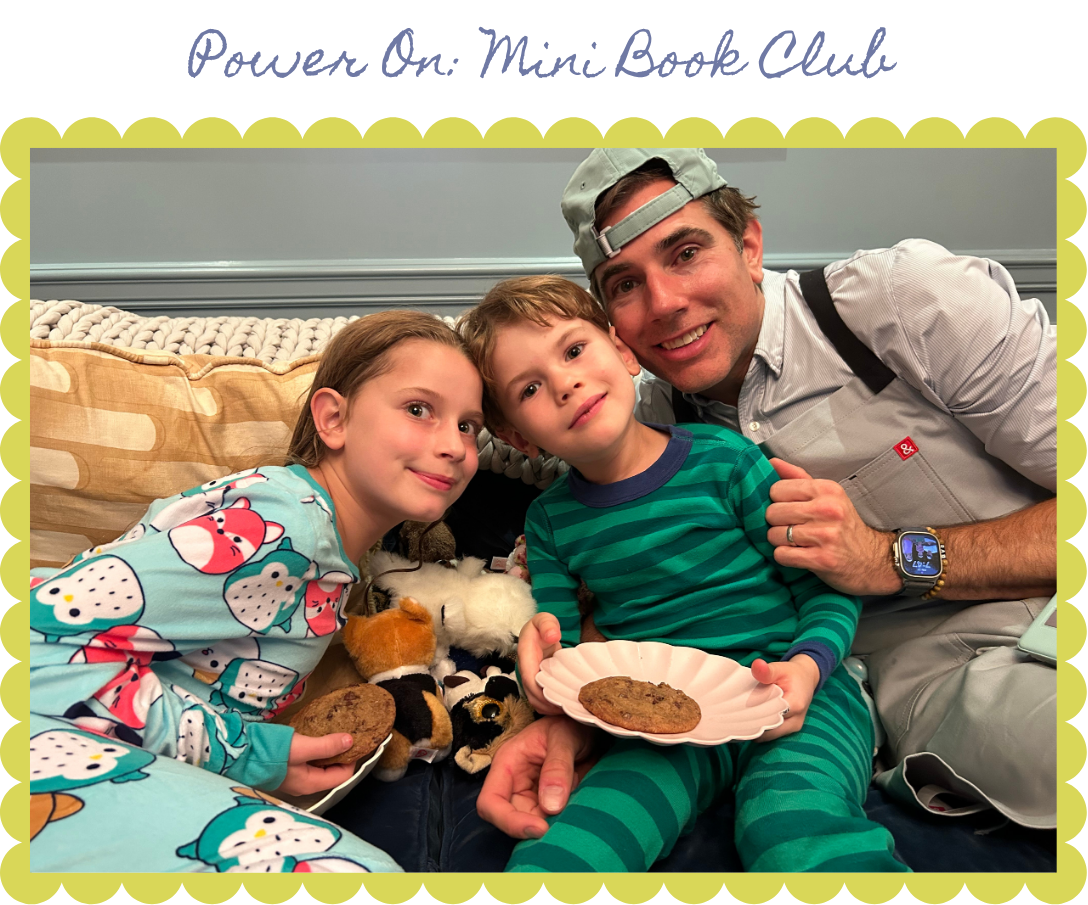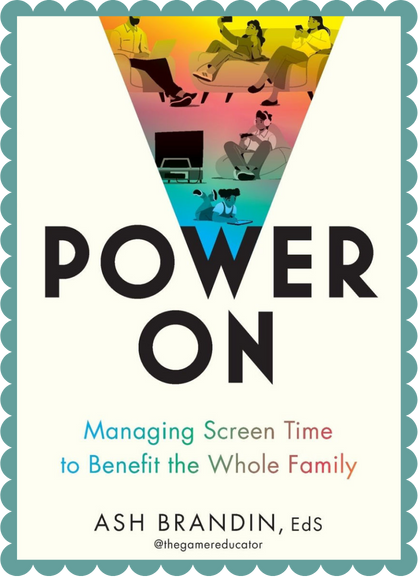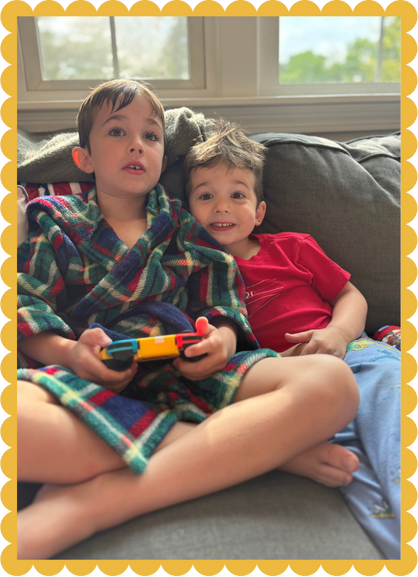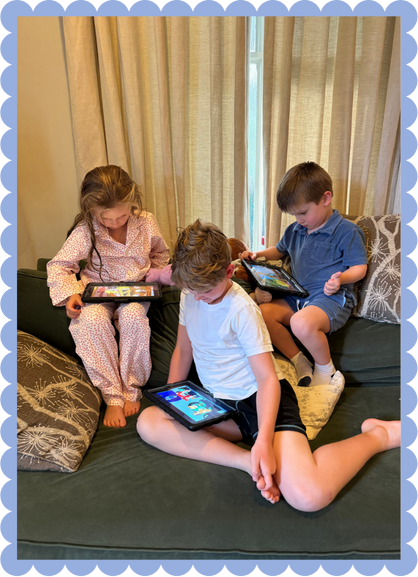Issue #32: Let’s Talk About Screen Time
Our 1st mini book club chat - all about navigating the tricky world of kids and screens... realistically!
When my girlfriend Abby shares a recommendation, I know it’s a guaranteed good one; she’s a legit trusted go-to source. I’ve known her for awhile now, since way back pre-kids, and she hasn’t steered me wrong yet.
So when she texted me about a new book she was enjoying, I added it to my queue immediately. And that simple suggestion turned into the impetus for this: an honest, insightful, real conversation between Abby, Amelia and I all about screen time.
The book is Power On: Managing Screen Time to Benefit the Whole Family by Ash Brandin. Ash is known as the @thegameeducator on Instagram and Substack, and in this book, they reframe everything we’ve been told about screens (so evil! stay away! you’re a bad mom to use them!) and replaces it with practicality, realism and empowerment for parents and all caregivers.
Plain and simple: it inspired us to think a bit deeper on this topic and how we want to raise our kiddos in this digital world (because it is a digital world whether we like it or not!).
We recorded our convo and transcribed it below in order to share this fun and informative chat with three curious mamas with you today! We hope you enjoy and that it leaves you pondering the true power and role of screens a bit more as well.
We’d love to hear YOUR thoughts so join us in the comments section and tell us: how do you manage screens in your home? What works, what doesn’t? And for fun… what’s your favorite way to enjoy screen time too!? (Liz loves the Great British Baking Show and Dancing With The Stars, and Amelia recently finished Your Friends & Neighbors and is eagerly awaiting the return of Nobody Wants This later this month.)

Why Power On?
Abby: I first came across the author as The Gamer Educator on Instagram. I’d seen them mentioned by parenting accounts I respected, and even though I’m usually confident in my parenting approach, screens and gaming aren’t areas where I feel especially knowledgeable. They stayed in the back of my mind as someone I’d turn to when I wanted to learn more.
When their book popped up in a roundup of new releases, I thought, this looks interesting. I had just finished The Anxious Generation and, while parts resonated, it didn’t fully click with me. This book felt like a counterpoint, so I started listening on Audible.
Screen time has always felt like the third rail of parenting—full of shame, guilt, and confusion. I appreciated that Ash’s perspective is probably more pro-screen than I naturally am, but it was a refreshing shift from the usual narrative.
Our Families Relationships to Screens
Liz: This all makes sense. So what’s your family’s relationship with screens right now?
Abby: We work with Dr. Rachel Kramer, a parenting coach known for her practical approach to screens. She also writes a wonderful newsletter. She suggests reassessing during natural transition points (like back-to-school) instead of just announcing big changes to screen time out of nowhere. That way it makes sense to kids.
With all the after-school activities my kids have going on, we had to adjust how we approach screen time. For us, school nights mean 30 minutes of iPad time after showers and before we read books and head to bed. I realized it was much harder to move them from screens to a non-preferred activity like showering or brushing teeth. It’s easier for them to log off when the next step is something enjoyable—like family time or reading together.
They can pick from Netflix, Disney+, PBS, or sometimes Peacock for sports for my oldest. Everyone wears headphones—a lifesaver. At one point, I let all three kids watch separately, but the noise was too much. Now it’s blissfully quiet.
Fridays are family movie night. I tried having the kids draw the movie options from a jar, but it turned into constant negotiations. Now sometimes I pick, sometimes they agree, sometimes we rotate.
The only gaming they do is through the PBS Kids Games app. It’s safe, closed, no chat. PBS has games that match the shows my kids love. The Wild Kratts one is a big hit. If they want to spend their whole 30 minutes there, fine. We uninstalled YouTube and YouTube Kids because even with the strictest parental controls, the content felt off. It was too weird, too unkind, not what I want them absorbing.
Amelia: Our kids get 30 minutes of screen time on school afternoons, but it has to be on the living room TV, and ideally, they watch together. When they do, they curl up under a blanket on the sofa and negotiate over what to watch.
For us, the predictability of a daily show helps prevent screen time battles. It also gives me a set window to tackle family admin or just take a breather. And on nights when after-school activities or homework don’t allow for screen time (which is often these days), they don’t feel deprived because they know it’s usually there. It’s worked well for us.
Fridays are family movie nights for us too, and we’re still figuring out how to decide what to watch. We’ve also tried the movie jar approach, but this week we’re testing something new. We’re planning out the next month of picks so everyone knows when their turn is coming.
I also work regularly with a parent coach, Jennifer Gillette, who has really helped me think through some of these bigger parenting decisions.
Liz: We cut out screens Monday–Thursday altogether a year or two ago. At first, the kids protested, but now it’s just the norm. Fridays are flexible—movie night or sometimes video games. Between school, activities, and the fact that my kids go to bed on the earlier side, there just hasn’t been time for screens anyway.
The big change this year was getting a Nintendo Switch. It was a huge discussion, because I’d resisted for so long. But my oldest wanted to play at friends’ houses, and I realized I’d rather bring it into our home where I can monitor.
Reading Power On really helped me reframe how I think about video games. I loved the idea that they can be a way to connect with your kids instead of something to avoid. We’re intentional about what we play—mostly Mario Kart and sports games.
I’ve caught myself falling into the trap of ranking activities, thinking some are “better” than others. But really, who’s to say that reading a book together is any more valid than playing Mario Kart together? In the end, it’s about balance and connection.
On Fridays, the kids can either play a family video game or we’ll do a movie night. It’s like our little treat after a screen-free week.
Weekends are looser, but even then, it’s still structured. On Sundays, my early riser knows he’s allowed to go downstairs, grab Cheerios, and put on a pre-approved movie until we wake up. Honestly, getting to sleep until 8:30 a.m. feels epic for my husband and me.
I’ll admit, sometimes I still feel guilty if they’ve been watching for over an hour before I come down. But at the same time, it gives us all rest, and it’s not every day.
Amelia: Like Ash said, screen time has to work for everyone—and on those early Sunday mornings, letting him watch cartoons when he’s up before everyone else makes sense to me. That was how it worked in my house growing up, too. There’s something so magical about those slow mornings with cartoons, especially when weekdays feel so busy and structured.
* Not surprisingly, we all agreed our screen time guidelines don’t apply on sick days, travel days, solo-parenting stretches, or those never-ending rainy afternoons.
Takeaways from Power On
Amelia: One of my biggest takeaways was how Ash dismantled so many assumptions around screen time. They refused to make it the enemy, which felt refreshing, especially since so much parenting advice paints screens as something to avoid. I really appreciated their neutral, balanced take: everything in moderation, no shame.
It reminded me of how we think about food. Our generation grew up with so much guilt and judgment around certain foods, but now we’re trying to create more neutrality for our kids. Ash’s idea of approaching screens the same way really stuck with me.
Another point that resonated was this: if kids never have screen time, how do they learn to navigate it later? It’s the same as having sweets—if you never had them growing up, how do you handle it when you’re suddenly making your own food choices?
If kids never have screen time, how do they learn to navigate it later?
I’ll admit, I’ve sometimes felt self-conscious when my kids write in school assignments about a favorite show or a weekend movie. I used to wonder what teachers might think. This book gave me permission to let go of that judgment. I’ve reframed my thinking and now appreciate that it sends the message that my kids have leisure time and I like that messaging.
It also made me think about my own childhood. I have such fond memories of watching TV after school—and also of riding bikes with neighborhood friends, babysitting, and taking scrapbooking classes. TV was just one part of a much bigger picture. The same is true for our kids now.
Liz: Yes, that idea of leisure really hit me too.
I’ll never forget our pediatrician when we lived in California. During COVID, when I had two boys under two, I told him I was worried my older son was watching too many cartoons. He looked at me and said, “Everybody’s allowed to zone out every once in a while, aren’t they?” It stopped me in my tracks. He was right—not everything needs to be enriching or educational. It’s a simple reminder, but such an important one.
That same message came through in Power On. One of my biggest takeaways from the book was the reminder that total avoidance of screens just isn’t realistic. It’s kind of like abstinence education—it doesn’t really work. Our kids are growing up in a digital world, and pretending we can keep them away from screens until they’re adults doesn’t set them up for success.
Instead, it makes more sense to teach them how to use technology in a healthy way so they can make better choices as they get older. I loved how the author framed it with so much realism. We can’t hide from screens—they’re part of life. It’s better to stay neutral and help our kids learn to handle and enjoy them responsibly.
Abby: I’ve realized I’ve kind of lost my ability to relax. It’s become a running joke with my therapist, how I’m always asking, “How can I relax more productively?” I’ve just lost that leisure muscle. Between pregnancies, raising kids, work, dogs, a house, and all the other responsibilities that come with this season of life, I haven’t really exercised that part of myself in years.
When I think about what I want to model for my kids, I don’t want them just to see a mom who’s always rushing, multitasking, and stressed. I want them to see me actually enjoying things—to see that it’s okay to rest and have fun without it being “productive.” Kids deserve leisure, too. Everything doesn’t have to be optimized or enriching. Sometimes, it’s enough just to enjoy the moment.
At back-to-school night, our beloved first-grade teacher said something that stuck with me: “Your kids are a mess right now. I know they’re a mess.” She reminded us that they’re three weeks into school, completely wiped from managing so much—academically, socially, emotionally. If they need to come home and watch Captain Underpants for half an hour, that’s okay. They’ve earned it.
Kids deserve leisure, too.
I have such a soft spot for The Great British Bake Off. It’s comforting, like Mr. Rogers for grown-ups, and it always reminds me that my kids are entitled to their own version of that kind of comfort and joy.
Lastly, I think a lot about how conversations around screens and kids often miss the bigger picture—especially for kids who are neurodivergent or part of marginalized communities. For some kids, online spaces or gaming can actually be a really meaningful source of connection. If you have a neurodivergent or LGBTQ+ kid, those online communities can be incredibly important. Social connection is what truly matters and if that happens through a screen, that’s okay. It’s far better than it not happening at all.
For neurodivergent kids in particular, it can sometimes be easier to connect through a screen than in person. I feel lucky that my kids do enjoy sports and in-person activities, but I recognize that’s not every child’s experience. If gaming gives a kid a sense of belonging or helps them connect, that’s valuable.
Thank you sincerely Abby for joining us in this conversation; it’s safe to say we’d love to do another one with you soon :)
The book Power On is available where all books are sold, and Ash can be found on Instagram at @thegamereducator and on Substack at . We can’t recommend this book enough!
Past issues to catch up on…
Amelia’s trip to Norway and Sweden - the wonderful and the real
A collection of fun reads/listens/buys if you need a “treat yourself” moment
Rose:
Amelia - Our family got to watch my daughter in her first 4th grade soccer game this week. I loved seeing her bright smile out on the field and her enthusiasm each time she blocked a goal. There’s something about 4th grade that feels like stepping into a whole new chapter of childhood. I’m here for it! Already counting down the days until her next game.
Liz - Dare I mention once again… the weather!! Holy moly, we wait all year for fall in New England and it’s putting on quite a show this year for us! Add in a better baseball experience this week, and all the joy and excitement with fall plans in progress and pumpkins everywhere, and smiles are spreading aplenty.
Thorn:
Amelia - Last week marked the start of the Jewish New Year, and yesterday was the Day of Atonement. I didn’t fast, but I did open myself up to reflection—to thinking about how I want to grow and show up differently in the year ahead.
Liz - A nasty cold hit our family starting last weekend and has carried through into this week. Really hoping this is just a cold and not the beginning of a long, sick season.
Bud:
Amelia - Our school’s annual carnival is tomorrow…YAY! It’s always such a fall highlight for our sweet school community. My kids can’t wait for all the fun—games, bake sale, arts & crafts, and face painting! Somehow, every year, the weather is perfect and I’m thrilled it’s supposed to be just as gorgeous this year!
Liz - Anyone/everyone else rocking out to the new music today!? Plus, we have our annual neighborhood Block Party this weekend and it’s always a fun time - my boys are SO excited! They stay up late, run around with friends playing capture the flag, the ice cream truck pays us a visit, an outdoor movie is shown… aka THE BEST night :)
** If you enjoyed this post, we’d love it if you gave it a LIKE (just click the heart icon below!)—it’s a free and easy way to help more people find our writing!









Love seeing and hearing about each family and their approach to screentime. So many solutions and ideas on the subject! All points well made and the book, Power On, is a great resource for families dealing with issues that are soooo 2025. I admire the thoughtfulness of young families in this age of technology. A great resource could be this comment section as readers shed light on the solutions they are finding helpful when managing the family screen time. Looking forward to hearing the thoughts from the readers of Savoring Each Season.
This was such a thoughtful conversation! We don’t have set daily rules in our house for TV - I frame it as a parenting tool for when I need to get something done or need a break (or cook dinner!), and I use it accordingly. This is usually 30 mins or so but I’ve learned to give myself grace if that needs to be extended.
Tablets are for weekends only which maybe nets out to about an hour/day (ish). I’ve found that early screen exposure (thanks Covid!) made them less attached to the screens because we aren’t overly restrictive, like you said with food. We all enjoy and deserve pleasure!!! And completely agree with you guys - I have the best memories of being curled up in my parent’s bed watching Inspector Gadget. Childhood joy comes in many forms!!!
I recently bought one of those square timers where you can just turn it to the number on the side then flip it up to start it (do you know what I’m talking about lol?!) for my own focus with work but my kids love using it and it’s been a great tool for screen time to just keep us mindful. And then the boundary is enforced by the timer, not me :)
Thanks again for all of this delicious food for thought!!